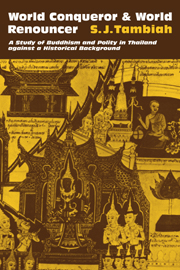 World Conqueror and World Renouncer
World Conqueror and World Renouncer Published online by Cambridge University Press: 10 November 2010
The Buddhist picture of the genesis of the world, society, and kingship is a studied and ironical reversal of certain aspects of the brahmanical version that stems from Vedic times; but the Buddhist intention is more than simply ironical, for it aspires to generate a rival and wholly different scheme of meaning although sharing with Hinduism certain elementary philosophical and conceptual particles.
A central difference between the two systems, which we shall develop in this and the next chapter, is that Buddhism is basically without ontology (in the sense that its ultimate elements, the dharmas, being momentary flashings, impermanent without duration, cannot be indexical of the “essence” of things or immanent entities like “self”), while Hinduism has this ontology, whose building blocks are notions of self, deity, and atman, and so on, as existent entities. Thus in understanding Buddhist cosmology we should appreciate at the outset that its gods represent rather than embody dharma, and although they are assigned ordering paradigmatic positions, they are transient, not eternal, beings subject to world process.
The problem of dating texts, though vexed, is not of critical interest for our purpose of conveying the basic features of the Vedic-brahmanical theory on the one hand and Buddhist theory on the other. When placed against the Buddhist Pali canon and Jatakas, the early brahmanical smrti or dharmasutra literature can be seen as having preceded them, and the works on arthashastra (the science of instrumental activity particularly relating to polity and economy), especially the work of Kautilya, which is a landmark, as succeeding them.
To save this book to your Kindle, first ensure [email protected] is added to your Approved Personal Document E-mail List under your Personal Document Settings on the Manage Your Content and Devices page of your Amazon account. Then enter the ‘name’ part of your Kindle email address below. Find out more about saving to your Kindle.
Note you can select to save to either the @free.kindle.com or @kindle.com variations. ‘@free.kindle.com’ emails are free but can only be saved to your device when it is connected to wi-fi. ‘@kindle.com’ emails can be delivered even when you are not connected to wi-fi, but note that service fees apply.
Find out more about the Kindle Personal Document Service.
To save content items to your account, please confirm that you agree to abide by our usage policies. If this is the first time you use this feature, you will be asked to authorise Cambridge Core to connect with your account. Find out more about saving content to Dropbox.
To save content items to your account, please confirm that you agree to abide by our usage policies. If this is the first time you use this feature, you will be asked to authorise Cambridge Core to connect with your account. Find out more about saving content to Google Drive.